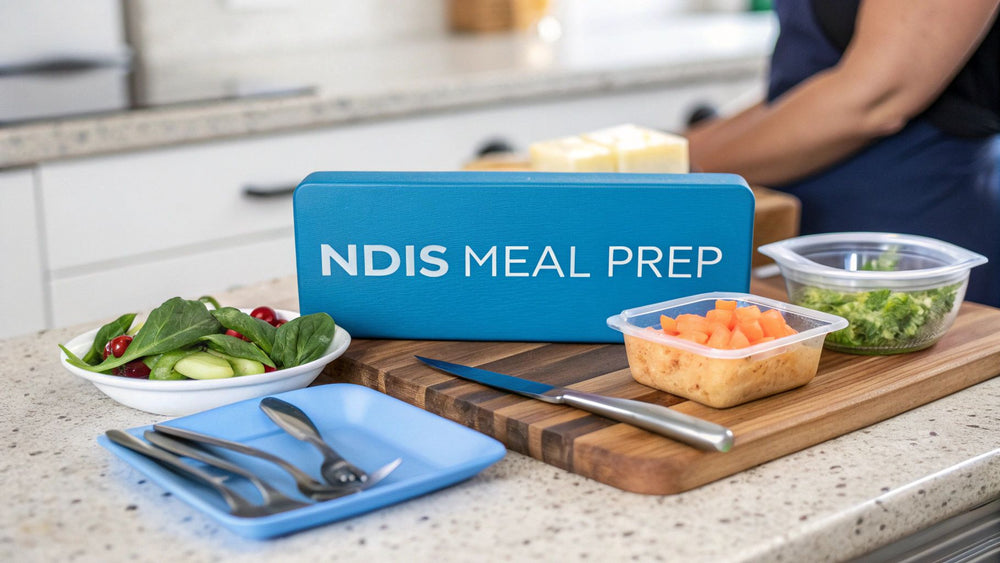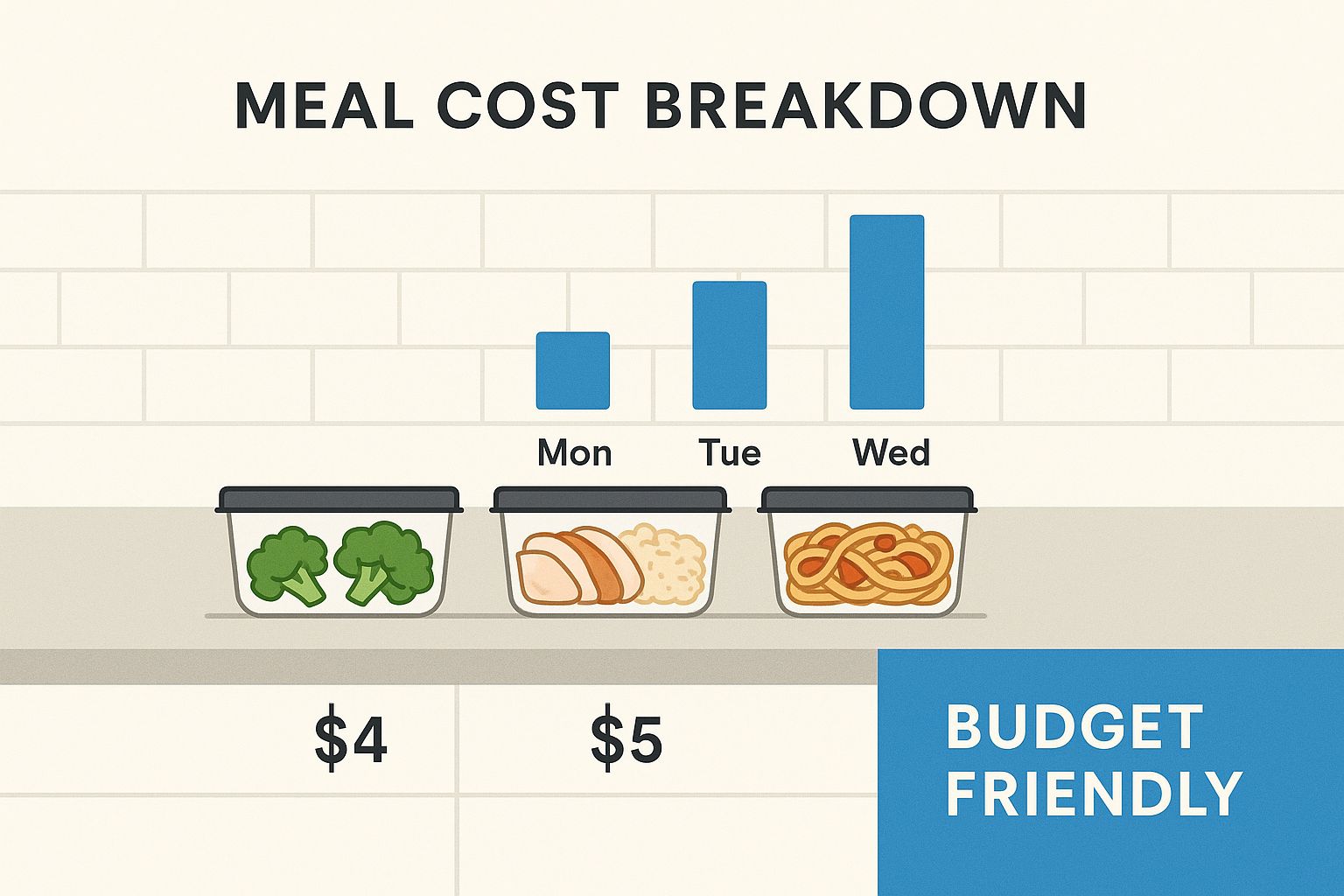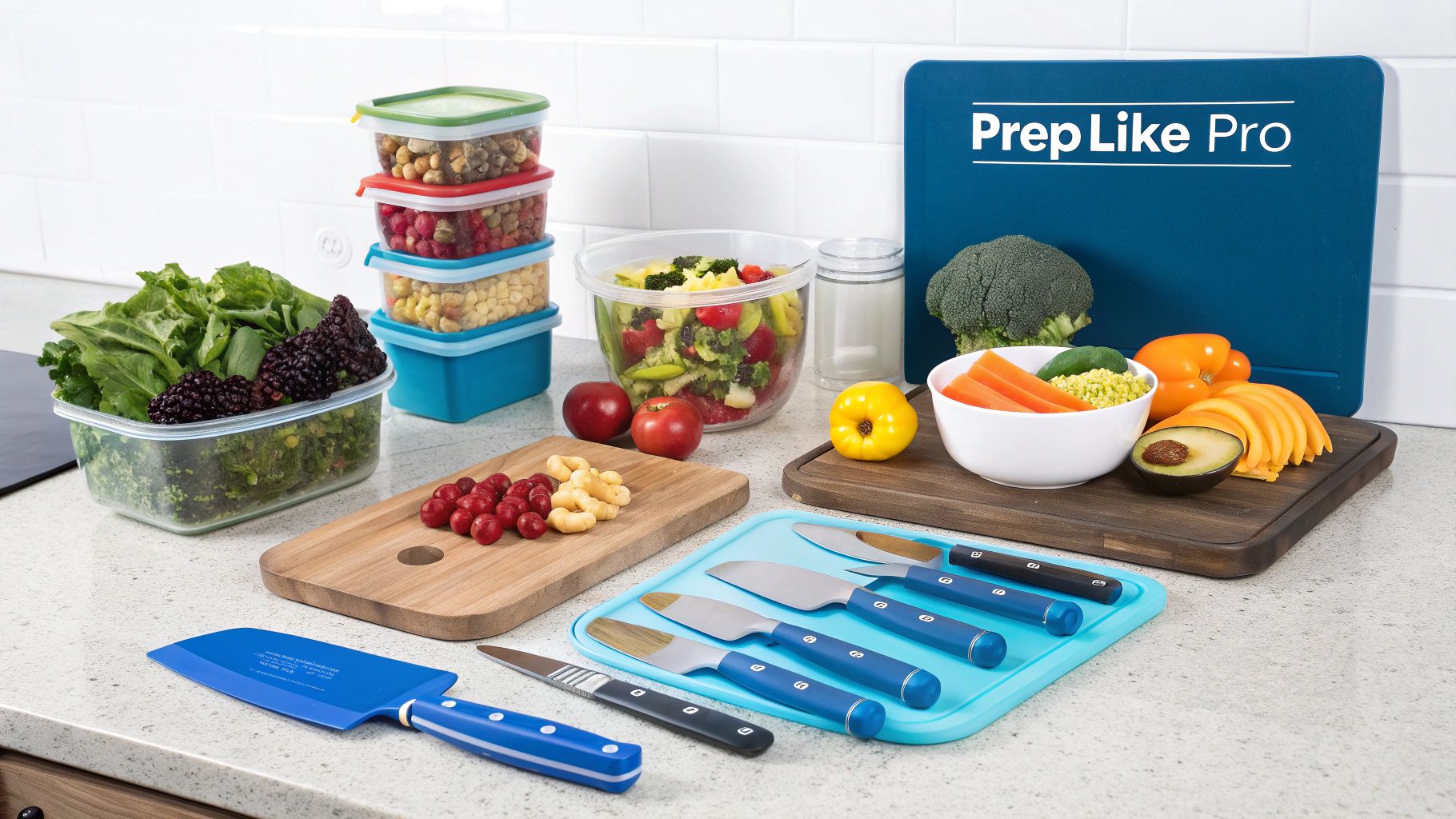NDIS Meal Preparation | Support Your Independence Today

Think of it like this: you have a personal kitchen assistant who steps in to handle the tricky parts of cooking, letting you enjoy nutritious, delicious meals without the stress. That's really the heart of NDIS meal preparation support. It’s not just about getting food delivered; it’s about breaking down the barriers your disability might put in the way of cooking for yourself or accessing healthy food.
This kind of support is a game-changer for independence and overall well-being. When you’re well-fed, you have more energy and time for other things, whether that’s building new skills, getting involved in the community, or simply enjoying a better quality of life at home. For more ideas on getting active in your community, check out our guide on inclusive activities and developing social skills.
In-Home Support vs. Meal Delivery
NDIS meal preparation isn't a single, rigid service. It comes in a couple of main forms, so you can find what works best for your specific needs and goals:
- In-Home Cooking Support: This is where a support worker comes to your home to help you in the kitchen. They might do all the cooking for you, or they could work alongside you, helping you build your own skills and confidence. It’s a fantastic option if you enjoy social interaction and want to learn.
- Meal Delivery Services: This is the ultimate in convenience. These services deliver pre-made, ready-to-heat meals straight to your doorstep. If you find daily cooking drains your time or energy, this ensures you've always got a healthy meal ready to go.
How Does the Funding Work?
One of the most common questions we hear is, "Does the NDIS pay for my groceries?" The short answer is no. Groceries are considered an everyday living expense that everyone has, so they aren't covered.
What the NDIS does fund is the service component—the time and labour it takes to plan, cook, and deliver your meals.
So, when you use a meal delivery service, the cost is split. The NDIS covers the preparation and delivery costs, and you pay a small co-payment for the raw ingredients.
Typically, the National Disability Insurance Scheme will cover about 70% to 80% of the total meal cost, which accounts for the service. You would then pay the remaining 20% to 30% for the food itself. This system makes sure you get the support you need without the NDIS covering expenses that fall outside its scope.
Here's a simple breakdown of how that funding split usually works for meal preparation services.
NDIS Meal Support Funding Breakdown
| Expense Category | NDIS Contribution | Participant Contribution |
|---|---|---|
| Meal Preparation Labour | Covered | Not Covered |
| Cooking & Packaging | Covered | Not Covered |
| Meal Delivery | Covered | Not Covered |
| Food Ingredients | Not Covered | Covered |
As you can see, the NDIS handles all the service-related costs, while your contribution is purely for the ingredients, just like any other grocery expense.
How to Qualify for Meal Preparation Funding

Getting NDIS funding for meal preparation isn't a given; it all comes down to showing that the support is both reasonable and necessary because of your disability. The key is to paint a clear picture for your NDIS planner, connecting the dots between your need for assistance and achieving your personal goals.
Think of it like building a case. Your job is to explain how your disability creates specific roadblocks when it comes to shopping, planning, or cooking. Just saying you don’t enjoy cooking won’t cut it. You need to focus on the real-world, functional challenges you face.
What NDIS Planners Look For
When an NDIS planner reviews your request for meal prep funding, they’re searching for a direct, logical link between your disability and why you need this particular support. It’s all about context.
They’ll weigh up a few key things:
- Your Disability-Related Barriers: Do you have mobility issues that make it unsafe or exhausting to stand in the kitchen? Perhaps cognitive challenges make it tough to follow a recipe or manage cooking times.
- Your Living Situation: Are you living on your own, or do you have family or housemates who might be able to help? The level of informal support you already have plays a big part in their decision.
- Your Personal Goals: How will having help with meals move you closer to your bigger NDIS goals? This could be anything from improving your health and well-being to freeing up energy for community activities or simply living more independently.
Getting this information across clearly is everything. A good support coordinator can be a massive help here, preparing you for these conversations and making sure your needs are properly understood. For more on this, check out our article on maximising your NDIS plan with support coordination.
Building Your Case with Scenarios
To make your request as strong as possible, use specific, real-world examples. Think about the day-to-day difficulties that get in the way of you preparing your own food.
Access to funding hinges on your individual circumstances. Planners look at whether you can shop and cook safely, if you have unpaid carers available, and the strength of your existing support network before they decide if meal prep is a reasonable and necessary support for you.
For instance, someone managing chronic fatigue might find their energy plummets by the afternoon, making it unsafe to handle a hot stove for dinner. Or, a person with a psychosocial disability could experience overwhelming anxiety during a busy supermarket trip, making the entire process of getting groceries and cooking unmanageable.
These kinds of concrete, function-based examples are far more persuasive than just asking for meal help. When you frame your request this way, you show exactly how the support helps you overcome the very real challenges created by your disability.
Budgeting for Meals in Your NDIS Plan
So, how do you actually pay for meal support with your NDIS plan? Think of your plan as your personal toolkit, filled with different resources to help you reach your goals. Meal preparation support is one of those tools, and it fits right into your Core Supports budget.
Specifically, the funding comes from a category called ‘Assistance with Daily Life’ (that’s Category 1). This is the same bucket of funding you might use for help with personal care or household chores. The NDIS sees getting help with your food as a fundamental part of managing day-to-day life. The good news is that this part of your budget is usually quite flexible, so you can allocate funds to various approved supports, including getting your meals sorted.
Linking Meal Support to Your Goals
Here's the most important part: you need to show your planner why you need this support. The NDIS doesn't just fund services; it funds outcomes. During your planning meeting, you need to draw a clear line between having meal support and achieving your bigger life goals.
For instance, you could explain how it helps you work towards:
- Improving health and well-being: "Having regular, nutritious meals delivered means I can manage my energy levels and health condition much better."
- Increasing independence: "A support worker can help me learn basic cooking skills, or a delivery service frees me up to live on my own with more confidence."
- Boosting community participation: "If I don't have to spend all my energy on cooking and cleaning up, I'll finally be able to join that weekly art class I've been wanting to try."
The trick is to frame NDIS meal preparation as a vital part of your overall strategy. It’s not just about convenience; it’s a building block for a healthier, more independent, and fulfilling life. Making this connection crystal clear is what convinces the NDIS to allocate the right funding.
Estimating Your Funding Needs
Walking into your planning meeting with a rough idea of the costs involved shows you've done your homework. It helps your planner see that you’ve thought everything through. Before you go, try to work out your potential weekly costs for the service.
Think about which option suits you best:
- Meal Delivery: Jump online and look up a few NDIS-approved meal providers. Check their average price per meal. Just remember, your NDIS plan will only cover the service component—the cost of planning, cooking, and delivery—which is typically around 70-80% of the meal's total price. You’ll still cover the cost of the raw ingredients yourself.
- In-Home Support: Figure out how many hours of help you’ll need each week. Then, multiply that number by the current NDIS Price Guide rate for an in-home support worker.
Having these figures on hand makes for a much smoother conversation. It ensures the budget you get is realistic and will genuinely cover your needs for the entire year. This kind of financial planning means you can manage your Core Supports budget without stress, knowing that consistent, reliable meal support is there when you need it.
Choosing the Right Meal Preparation Service
Once you have your funding sorted, the next step is finding a provider that truly fits into your life. This isn't just about the food itself; it's about choosing a style of support that clicks with your personal goals, your tastes, and your daily rhythm. Getting the right NDIS meal preparation service can make a massive difference to your independence and overall wellbeing.
Essentially, you have two main paths you can go down: the convenience of ready-made meal delivery or the personal touch of in-home cooking support. Each has its own distinct advantages, and the best choice for you might be completely different from someone else's.
Meal Delivery vs. In-Home Support
Meal delivery services are a brilliant option if you're looking to save time and energy. They drop off a variety of pre-cooked meals right at your door, which is perfect if you need a reliable, no-fuss solution for your nutrition.
On the flip side, in-home support offers a much more hands-on and social experience. A support worker can come to your home to cook for you—or even with you—in your own kitchen. This is a fantastic way to pick up new cooking skills and enjoy some welcome company at the same time.

As you can see, having pre-portioned meals can be a really smart way to use your NDIS budget. The NDIS covers the service and preparation costs, making it an accessible way to stay on top of your nutrition without financial stress.
To help you figure out which path is right for you, let's break down the key differences between these two popular options.
Comparing Meal Delivery and In-Home Cooking Support
| Feature | Meal Delivery Service | In-Home Cooking Support |
|---|---|---|
| Convenience | High - Meals arrive ready to heat and eat. | Moderate - Requires scheduling and time for the support worker's visit. |
| Customisation | Standard - Options for major dietary needs, but less personal flexibility. | High - Meals are tailored to your exact tastes and dietary requirements. |
| Social Interaction | Low - Primarily a transactional delivery service. | High - Offers companionship and a chance for collaborative cooking. |
| Skill Building | None - The focus is on providing a finished product. | High - Excellent opportunity to learn cooking skills and meal planning. |
| Cost Structure | Typically a co-payment model (you pay for ingredients, NDIS for service). | Billed at an hourly rate from your Core Supports budget. |
Ultimately, the choice comes down to what you value most. Is it pure convenience, or is it the experience of learning and connecting with someone in your own home?
Key Questions for Potential Providers
Before you sign up with anyone, it’s so important to ask the right questions to make sure they're a good fit. Doing your homework upfront gives you peace of mind and helps you find a reliable partner for your NDIS meal preparation journey. This is a critical part of your overall support system, and you can get more great advice by reading our guide on choosing the right disability support in Adelaide.
Choosing a provider isn't just a logistical decision; it's about finding a service that respects your choices and supports your goals for a healthier, more independent life.
Keep this checklist handy when you're talking to potential providers:
- Are you a registered NDIS provider?
- How do you handle specific dietary requirements, allergies, or texture-modified foods?
- Can I look at a sample menu to get a feel for the meal variety?
- What’s your process for giving feedback or making changes to my meal plan?
- For in-home support, how do you match your support workers with participants?
Taking the time to dig into these details will empower you to pick a service that doesn't just feed you well, but genuinely improves your quality of life.
Connecting Nutrition Needs with Meal Support
Good nutrition is more than just having food on the table; it’s about making sure that food actively supports your health and wellbeing. For NDIS participants with specific or complex medical conditions, off-the-shelf meals often just don't cut it. This is where the real power of NDIS meal preparation shines—when it’s paired with expert advice from a dietitian.
Think of it like building a house. A dietitian is your architect, drawing up the detailed blueprints for your nutritional needs. Your support worker or meal delivery service is the builder, using those plans to construct the perfect meal. Your NDIS plan can fund a dietitian to create this personalised nutritional strategy, ensuring every meal works towards your specific disability-related health goals.
Integrating Dietetic Advice with Meal Services
Once you have that professional advice from a dietitian, the next step is putting it into action. A good dietitian won't just hand you a piece of paper; they’ll collaborate directly with your meal provider or in-home support worker.
This partnership makes sure nothing gets lost in translation. For instance, they can:
- Give your support worker exact recipes and clear cooking instructions.
- Clearly communicate specific dietary needs—like low FODMAP, gluten-free, or texture-modified foods—to your meal delivery service.
- Show your support team how to handle particular feeding routines or spot any signs of nutritional problems.
This hands-on, integrated approach ensures the expert advice you’re paying for is actually making a difference in your daily life. For many people, feeling healthier and more energised is a huge step towards getting out and about. You can explore how the NDIS supports this in our article on community participation and the NDIS.
How to Advocate for Nutritional Support
Getting the right funding for a dietitian isn't always a given, unfortunately. It can be a real struggle, often because there's a lack of understanding within the NDIS about just how vital nutrition is. Dietitians Australia has highlighted that plans often only include about 10 hours per year for dietetic services, which is rarely enough for someone with complex health needs. You can read more about these challenges in their report.
To successfully advocate for this support, you have to clearly link your need for nutritional guidance to your specific health and functional goals during your NDIS planning.
Don't just ask for a dietitian; explain the why. Frame it in terms of outcomes. For example, you could say, "To manage my diabetes and boost my energy so I can get to my weekly social group, I need a dietitian to create a specific meal plan that my support worker can follow." This direct connection between the service and your goals makes it much harder to ignore and significantly boosts your chances of securing the funding you need.
Simple Tips for Meal Planning and Shopping

Even with great support, being involved in your own meal choices is a fantastic way to build life skills and stay in control of your health. When you collaborate on a plan for NDIS meal preparation, you get to eat food that’s not only good for you but also genuinely what you feel like eating.
It's all about teamwork. Try sitting down with your support worker once a week to sketch out the meals for the coming days. This small act puts you in the driver's seat, ensuring you’re looking forward to your food while still meeting your dietary goals.
A simple weekly menu can completely change your routine. It gets rid of the daily "what's for dinner?" stress and makes grocery shopping a much smoother, more efficient task for you or your support person.
If you're keen to take self-sufficiency a step further, learning about cultivating a survival garden can be a rewarding way to get fresh, seasonal ingredients right at your doorstep. It adds a whole new level of connection to the food on your plate.
Create a Smarter Shopping List
With your menu sorted, a well-organised shopping list is your next best tool. Instead of just jotting down items as you think of them, try grouping everything by its section in the supermarket. It’s a simple trick that saves a huge amount of time and stops you or your support worker from wandering up and down the aisles.
Here's an example of how a smarter list might look:
- Produce: Onions, carrots, spinach, apples
- Protein: Chicken breasts, tinned tuna, eggs
- Pantry: Brown rice, canned tomatoes, olive oil
- Dairy: Milk, Greek yoghurt, cheese
This structure makes the whole shopping trip quicker and way more focused.
Embrace Batch Cooking and Storage
Batch cooking is an absolute game-changer for saving time and energy throughout the week. The idea is simple: prepare a large amount of a meal, then portion it out to eat over the next few days. You could ask your support worker to whip up a big pot of spaghetti bolognese, a flavourful curry, or a hearty soup.
Of course, good storage is what makes this strategy work. Use clear containers and label them so you can see exactly what you've got. Having these ready-to-go meals in the fridge or freezer means there's always a delicious, home-cooked option available, building your confidence and independence one meal at a time.
Your NDIS Meal Preparation Questions Answered
When you're trying to figure out NDIS funding, it’s completely normal to have a lot of practical questions pop up. Let's clear up some of the most common queries about meal preparation support so you can move forward with confidence.
Getting the right help in the kitchen can be a massive step towards more independence. We see it all the time with the people we support, and you can see what’s possible by reading about some of our clients’ stories of inspiring independence.
Can My NDIS Funding Cover Meals for the Whole Family?
No, NDIS funding is specifically for you, the participant. The plan covers the reasonable and necessary costs tied to preparing your meals, not meals for your family, friends, or carers. Providers will always make sure to invoice only for the part of the service that directly supports you.
What if I’m Not Happy With My Meal Provider?
You always have choice and control over your supports. If you're not getting what you need from a meal delivery service, the best first step is to talk to them directly and see if you can sort out the issues.
If that doesn't work and you're still not satisfied, you are absolutely free to look for and switch to another NDIS-registered provider who is a better match for your tastes and dietary needs.
Your NDIS plan is built to be flexible. If a support isn't working for you, you have the right to find one that does. Never feel like you're locked into a service that isn't helping you reach your goals.
Does My Plan Need to Specifically Say 'Meal Preparation'?
Not usually, no. Funding for this kind of help most often comes from your flexible Core Supports budget, under the category ‘Assistance with Daily Life’.
So long as meal preparation is a reasonable and necessary support that helps you meet your disability-related goals, you can generally use your Core funds for it. You don't need a specific line item named 'meal preparation'.
Can I Get Help With Grocery Shopping Too?
Yes, you can. Help with grocery shopping can definitely be funded through your NDIS plan. This support usually falls under a couple of different categories:
- Assistance with Daily Life: This applies if a support worker helps you with the shopping and bringing the groceries home.
- Assistance with Social, Economic and Community Participation: This is used if the main goal is to support you to get out into the community and do your own shopping.
At Vana Care, we believe the right support should feel like a genuine partnership. If you’re in South Australia and looking for a provider who truly listens and designs support around your personal goals, we’re here to help. Discover our personalised in-home and community support services by visiting vanacare.com.au.


